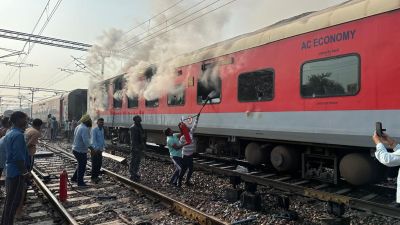Indian academia and industry need to work together during peacetime to meet the 100-day challenge of developing a vaccine against a new pathogen, experts have suggested during the international meet at Translational Health Science and Technology Institute (THSTI) in Faridabad.
They said the academia must create a library of vaccine platforms for pathogens with pandemic potential and the industry needs to increase capability to manufacture not just the finished product but also the raw materials.

“Covid-19 has given a wake up call to prepare ourselves for any future threat and it is timely that Department of Biotechnology and THSTI are leading India’s IndCEPI programme for future preparedness. The Biotechnology Department was at the centre of pandemic response and took unprecedented steps to curb Covid-19 threat. (It) quickly set up patient cohorts, bioassay systems, immune and cellular response assays, animal studies required for vaccine development, and supported vaccine industry in developing India’s first DNA and protein subunit vaccine Corbevax,” said Union Minister for Science Dr Jitendra Singh at the two-day meet, which concluded on Tuesday.
Story continues below this ad
THSTI Director Dr Pramod Garg said the discussions will be distilled to create a roadmap for policy makers. The meet was attended by former WHO chief scientist Dr Soumya Swaminathan, former principal scientific adviser Prof K VijayRaghanvan and former director of the National Institute of Virology Dr Priya Abraham among others.
Dr Swaminathan said there was a need to also develop manufacturing capabilities across the world to ensure more equitable distribution of vaccines.
Working on various disease biology and compatible vaccine platforms by the academia even in the absence of an epidemic, in partnership with industry from the initial stages can help quickly develop successful vaccine candidates in times of need, experts said.
“The knowledge of disease biology can only come from the academia,” said Dr Sanjay Singh from Gennova, which developed India’s mRNA vaccine against Covid-19.
Story continues below this ad
Harshet Jain from Panacea Biotech said academia cannot start working only when there is a pandemic. “We need the academia to create ideation banks that are shared with the industry,” he said, adding that working with industry from the initial stages can prevent regulatory problems in future.
Incidentally, THSTI, Panacea Biotech, and CEPI (Coalition for Epidemic Preparedness Innovations) have formed a consortium to work towards a broadly protective vaccine against not just Sars-CoV-2 that causes Covid-19 but also other betacoronaviruses such as SARS and MERS. The consortium has received $12 million funding from CEPI.
Keynote speaker Prof VijayRaghavan said to succeed biotech research needs to happen not just in a few elite institutions but in a broader ecosystem.
Dr Swaminathan said manufacturing and distribution networks also have to be established in countries across the world. She said African countries hardly have vaccine manufacturing capability and setting it up will not only ensure speedy production but also equitable distribution.
Story continues below this ad
Industry experts said India needed to increase domestic manufacturing capabilities not just for the finished product but raw materials.
Dr Garg said there is a need for a clinical trial network of elite institutions across the country that will help with quality assurance of the data instead of a clinical research organisation picking up sites that may have limited experience.









